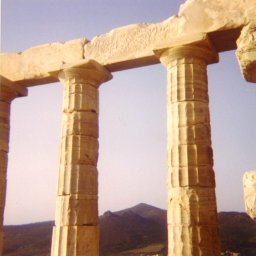
|
The Dramas of Euripides |
Euripides was born in Salamis in 480 B.C.E. Along with Aeschylus and Sophocles he was one of the three leading ancient writers of tragic plays. Very little is known about his personal life; it is belived that he came from a wealthy family and was politically active. Euripides left Athens in 408 B.C.E. and took up residence in Macedonia under the sponsorship of its king; he died shortly thereafter. He did not win as many competitions as Aeschylus or Sophocles, and was used as a running joke in Aristophanes' plays, where he appears as a satirical character. However his dramas became more popular than the other two 'immortals' as time went by. His greatest works are Alcestis, Medea, Electra and The Bacchae.
The Trojan Women
translated by Gilbert Murray [1915]
transcribed by Eliza at sacredspiral.com. Thanks Eliza!
Euripides and His Age
by Gilbert Murray [1913]
A complete survey of the drama of Euripides, along with the historical, social and religious context in which he wrote.
Alcestis Translated by Richard Aldington
Andromache Translated by E. P. Coleridge [1910]
The Bacchantes
The Cyclops Translated by E. P. Coleridge [1910]
Electra Translated by E. P. Coleridge [1910]
Hecuba Translated by E. P. Coleridge [1910]
Helen Translated by E. P. Coleridge [1910]
The Heracleidae Translated by E. P. Coleridge [1910]
Heracles Translated by E. P. Coleridge [1910]
Hippolytus Translated by E. P. Coleridge [1910]
Ion Translated by Robert Potter [1887]
Iphigenia in Tauris Translated by Robert Potter [1887]
Iphigenia At Aulis
Medea Translated by E. P. Coleridge [1910]
Orestes Translated by E. P. Coleridge [1910]
The Phoenissae Translated by E. P. Coleridge [1910]
Rhesus
The Suppliants Translated by E. P. Coleridge [1910]
The Trojan Women